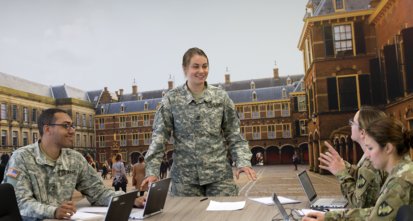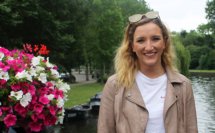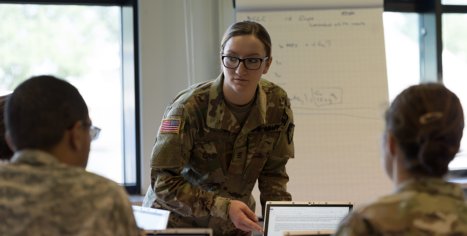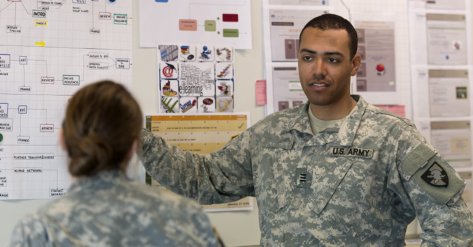Former Internships
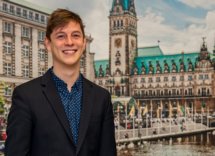 Mr Maurice Stette (Germany) works as an intern at the Concepts, Interoperability and Capability (CIC) branch of the CCOE from January to April 2019. During his time at the CCOE, his main focus is to review and update the “Resilience and Civil Preparedness” publication. Maurice has been studying Political Science at the Philipps-Universität Marburg and the Freie Universität Berlin since October 2015.
Mr Maurice Stette (Germany) works as an intern at the Concepts, Interoperability and Capability (CIC) branch of the CCOE from January to April 2019. During his time at the CCOE, his main focus is to review and update the “Resilience and Civil Preparedness” publication. Maurice has been studying Political Science at the Philipps-Universität Marburg and the Freie Universität Berlin since October 2015.
During his studies, he developed interests in the topic of security politics, especially in hybrid warfare and civil preparedness, crisis and disaster management, as well as in civil-military cooperation. From 2016 until 2019 he worked as a student assistant at Oxfam Germany, getting first insights into the work of an international non-governmental organisation dealing with crisis and disaster management.
Also, he completed an internship at the headquarters of the German Red Cross in Berlin, working in the Disaster Management Branch. In that role, he contributed, among other things, to the civil-military liaison between the German Red Cross (GRC) and the German armed forces. He attended as a training assistant for several exercises and courses like the hygiene and health promotion course in Berlin. Also, he was part of the working group on civil-military cooperation from the GRC held in the CIMIC Centre of the German armed forces in Nienburg. Furthermore, he participated for the GRC in the “Information – und Lehruebung des Sanitätsdienstes der Bundeswehr 2018“, in Feldkirchen.
To build on these experiences and deepen his knowledge about CIMIC and especially in resilience and civil preparedness, Maurice applied for the CCOE internship.
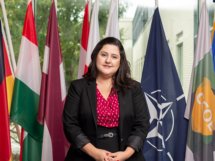 Ms Geovanna Giannini de Araujo (Brazil) works as an intern at the Concepts, Interoperability and Capability (CIC) Branch of the CCOE since August 2018. During her time at the Centre, her focus is to review the ‘Good Governance Makes Sense’ publication.
Ms Geovanna Giannini de Araujo (Brazil) works as an intern at the Concepts, Interoperability and Capability (CIC) Branch of the CCOE since August 2018. During her time at the Centre, her focus is to review the ‘Good Governance Makes Sense’ publication.
Geovanna is an International Relations (BA) student at the Institute of International Relations of the Pontifical Catholic University of Rio de Janeiro/ Brazil (IRI/PUC-Rio). In 2018 she worked as a junior researcher on human rights, sustainable development and housing for the United Nations Human Settlements Program in Cabo Verde, Africa. In this position, she could learn and exercise her abilities on cooperation between actors at local, national and international levels.
She had the opportunity to be part of a research team to take advanced studies in the Brazilian Peace Operations Joint Training Center (CCOPAB) during the year of 2017. Geovanna helped IRI/PUC-Rio, in the context of the Brazilian Research Network on Peace Operations (REBRAPAZ), is responsible for gathering information regarding the Brazilian peacekeeping engagement, with particular focus on the protection of civilians and gender issues. At the same year, she was invited to represent her university in the Armed Forces Headquarters in Brasilia – Brazil capital.
She attends several courses and workshops, like the Integrated Protection of Civilians workshop in 2017, at the Brazilian Superior War College, with the theme being “The work of the various deployed institutions in operations under the aegis of international organisations to promote the protection of civilians in unstable environments”. Geovanna was also a participant at the CCOPAB Civil-Military Coordination Course in 2016, which was part of the preparation of the 26th Brazilian Contingent to the United Nations Mission Stabilization in Haiti, along with the peacekeepers.
Geovanna hopes her experience in the CCOE can bring her a broader knowledge about CIMIC and in all of the cross-cutting topics related to it.
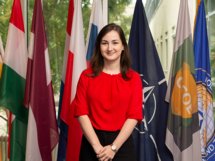 Ms Diana Dascălu (23, Romania) worked as an intern in the Concepts, Interoperability, and Capability (CIC) Branch, from August to November 2018.
Ms Diana Dascălu (23, Romania) worked as an intern in the Concepts, Interoperability, and Capability (CIC) Branch, from August to November 2018.
Diana recently graduated with an MA in International Security and Terrorism from the University of Nottingham/ United Kingdom, with a Master’s thesis focused on terrorist groups’ strategies of legitimation in front of relevant audiences. Diana’s academic experience is grounded in Social and Cultural Psychology, and in International Relations and Security, with the education received both in the United Kingdom and the United States.
Throughout her studies, Diana gained relevant work experience in several security- and military-related domains, particularly in research and analysis. For example, Diana completed a research internship at the Cline Center for Advanced Social Research/ United States, where she analysed the causes and implications of ethnic and religious conflict, with a geographical emphasis on the Middle East and North Africa (MENA) region and the Caucasus. Later on, while employed as a Research Associate at the Institute for Conflict, Cooperation, and Security/ United Kingdom, Diana conducted research on hybrid warfare, particularly on terrorism/ counterterrorism and insurgency/ counterinsurgency. While there, she also contributed to writing a report on hybrid warfare in “grey zone” conflicts, commissioned by the US Pentagon Joint Staff. Diana also previously interned with NATO’s SHAPE, where she was trained as an analyst, focused on the Middle East.
Following the completion of her Master’s degree, Diana started an internship with CIMIC COE, where she will focus on revising the Rule of Law Makes Sense publication.
 Ms Mariella Biegeler (Germany) worked as an intern at the Concepts, Interoperability and Capability (CIC) branch of the CCOE from January to March 2018. She focused during her time at CCOE on Building Integrity and its practical application.
Ms Mariella Biegeler (Germany) worked as an intern at the Concepts, Interoperability and Capability (CIC) branch of the CCOE from January to March 2018. She focused during her time at CCOE on Building Integrity and its practical application.
Mariella has been studying International Relations and Management (BA) at the Ostbayerische-Technische-Hochschule Regensburg/ Germany since October 2015. During her integrated practical semester abroad, she spent two months as an intern at the Permanent Mission of Germany to the United Nations and other International Organizations in Geneva/ Switzerland, focusing on The United Nations Economic Commission for Europe, United Nations Conference on Trade and Development and development organisations such as Joint United Nations Programme on HIV/AIDS and The Global Polio Eradication Initiative as well as two months at the Syria and Iraq Office of the Konrad-Adenauer-Foundation in Beirut/ Lebanon.
She completed her semester abroad at the Ecole de Gouvernance et d’Economie in Rabat/ Morocco, while also supporting the Regional Program for Climate Change and Energy Security of the Konrad-Adenauer-Foundation in Rabat.
She developed an interest in the CCOE and its work through her participation at NATO biggest CIMIC Exercise JOINT COOPERATION 2016 in Nienburg/ Germany. During this exercise, she had the opportunity to gain first insights into Civil-military cooperation. To build on these experiences and deepen her knowledge about CIMIC, she applied for the CCOE internship.
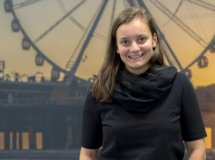
Ms Neža Zajc (Slovenia) has started an internship at CIMIC in September 2017. First, she participated in the CCOE conducted NATO CIMIC Field/Staff Worker Course and then continued her work at the Concepts, Interoperability, and Capability (CIC) branch. During her internship, she focused on research, work, organisation and support of the Community of Interest Conference.
Neža graduated in Political Sciences – Defence Studies at the Faculty of Social Sciences in Ljubljana/ Slovenia in 2015. Her thesis focused on the attitude of educated Turkish youth towards Syrian refugees; the perception of jeopardy and their standpoint in the context of multiculturalism.
During her bachelors she participated in the Erasmus Student’s Exchange Programme in Istanbul/ Turkey, where she studied International Relations at the Marmara University (2014). From October 2016 until July 2017 she underwent an internship at the Permanent Representation of the Republic of Slovenia to the European Union in Brussels/ Belgium, where she was involved in the legislative process of the European Union (EU), especially in working groups on external relations of the EU and migrations. Currently, she is finishing her master’s degree at the same chair and writing her master’s thesis about security implications of the recent migration crisis on the EU and its relation with Turkey.

Ms. Eva Mattes (Germany) worked as an intern at the Concepts, Interoperability and Capability (CIC) branch of the CCOE from October to December 2017. She supported the CIC-staff members in their task concerning their topic utilizing the concept Building Integrity into practical use.
She has been studying Political Science and Sociology at the Ruprecht-Karls University in Heidelberg/Germany since October 2015. In the past, she completed an internship at the German Atlantic Association in Berlin/ Germany, where she supported the organization of a variety of events concerning NATO and transatlantic security.
Eva is a member of the Forum for international Security Heidelberg/ Germany, organizing discussions and talks on international security issues. Moreover, she was part of a team planning the Heidelberger Symposium 2017, an interdisciplinary student initiative in Germany. Apart from that, she worked as a student assistant supporting a project concerning diffusion, learning, and cooperation in managing transnational conflicts.
Her academic interests focus on international relations as well as foreign and security policy.
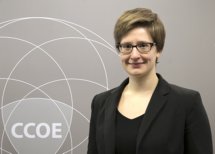 Mrs. FREDERIKE SCHMITT (22, Germany) began her CCOE internship at the Training & Education (T&E) Branch in April 2017. One of her main tasks was to support the development of CCOE’s e-learning program with a focus on the new NATO CMI Basic Training requirements. She also handled the technical implementation of the e-learning application into the ILIAS software.
Mrs. FREDERIKE SCHMITT (22, Germany) began her CCOE internship at the Training & Education (T&E) Branch in April 2017. One of her main tasks was to support the development of CCOE’s e-learning program with a focus on the new NATO CMI Basic Training requirements. She also handled the technical implementation of the e-learning application into the ILIAS software.
Frederike graduated in “International Emergency & Disaster Relief” (BA) in 2016. During her studies she developed interests in the topic of conflict resolution, especially in hybrid warfare and terrorism, as well as in civil-military cooperation. Consequently, she applied for an internship at the Academy for Crisis Management, Emergency Planning and Civil Protection (AKNZ) in Ahrweiler, Germany. Joining the branch for international training and civil-military cooperation at the academy, she worked for three months with both the civilian and military personnel.
Moving more towards the military aspects of international emergency and disaster relief, she decided to take a closer look at the Army, spending three months at the German Bundeswehr Operational Communications Center in Mayen, near Ahrweiler. In order to gain a deeper understanding of military and civil work in an international environment, she applied for this internship at the CCOE.
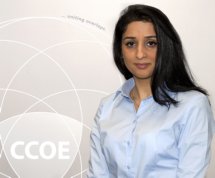 Ms. Lala Mustafazade (29, Baku, Azerbaijan) began her CCOE internship at the Concepts, Inter-Operability and Capability (CIC) Branch in February 2017. Together with the branch staff, she developed doctrinal products elaborating on the required NATO CIMIC contribution for disaster management.
Ms. Lala Mustafazade (29, Baku, Azerbaijan) began her CCOE internship at the Concepts, Inter-Operability and Capability (CIC) Branch in February 2017. Together with the branch staff, she developed doctrinal products elaborating on the required NATO CIMIC contribution for disaster management.
Ms. Mustafazade studied at the University of Leiden, where she obtained a Master’s Degree in ‘Crisis and Security Management’ in 2016. She wrote her thesis on the humanitarian response to natural disasters by comparing the disaster responses to the Haitian and Nepalese earthquakes. She obtained her bachelor degree in “Regional Studies” from the Western University in Azerbaijan.
Lala has prior hands-on experience in the field of crisis and disaster management. Before joining CCOE, she worked at the Ministry of Emergency Situations of the Republic of Azerbaijan. In that role she developed strategies to strengthen the co-operation between the Ministry and the various international organizations, while working on international projects, aimed to enhance the national capacity for disaster preparedness and risk reduction.
She attended various programs and seminars on civil security, civil emergency planning and disaster risk reduction at the NATO School in Oberammergau (Civil Emergency Planning Course), the George C. Marshall European Center for Security Studies (Seminar on Transatlantic Civil Security), and at the European Union Eastern Partnership Program (England, PPRD course).
Kirsten Calmus, United States Military Academy, Class of 2018
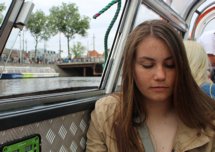 Working at the CCOE in The Hague for the last three weeks has been an experience I will never forget. I was given the opportunity to learn about the importance of CIMIC on an international scale as well as explore The Netherlands. During the work day, two other cadets and I edited a short book on the development of the CCOE for the 10th Anniversary Celebration. This text allowed us to gain a deeper understanding of why CCOE is important and how past conflicts have caused the increased need for CIMIC throughout the world. Working at the CCOE also allowed me to interact with officers from other countries Military’s which was enlightening and educational to gain a better understanding of how their Army’s function and their differences from the U.S. Army.
Working at the CCOE in The Hague for the last three weeks has been an experience I will never forget. I was given the opportunity to learn about the importance of CIMIC on an international scale as well as explore The Netherlands. During the work day, two other cadets and I edited a short book on the development of the CCOE for the 10th Anniversary Celebration. This text allowed us to gain a deeper understanding of why CCOE is important and how past conflicts have caused the increased need for CIMIC throughout the world. Working at the CCOE also allowed me to interact with officers from other countries Military’s which was enlightening and educational to gain a better understanding of how their Army’s function and their differences from the U.S. Army.
Our time away from work gave us time to learn to about The Netherlands and experience some of the tourist experiences it has to offer. After work, the other cadets and I would take the bikes provided to us by the CCOE and ride to the city center of Delft, a nearby town. The bike system in The Netherlands was unlike anything I have seen in the United States. It seemed as though biking was the best and quickest way to get around because where there is a road, there is a bike path with less traffic. In the city center we would get dinner and check out surrounding shops.
After a week of working on editing the first couple chapters of the book, we went to Amsterdam for the weekend. We had the chance to rent bikes, visit the Anne Frank House and Van Gough museum, and go on a boat tour through the canals. The Anne Frank house was a very eye opening experience into the life that many had to endure throughout the war and the lengths that many families went to to survive. The tour through the house was a walking audio tour that guided you from room to room. While walking through the house filled with people, there were hardly any words spoken from anyone due to their fascination and respect for the stories being told on the tour. Even though the rest of our adventures did not have the impact that the Anne Frank house did, they were all fun and created memories that I will never forget.
The second work week, we had the opportunity to participate in IO/ NGO day which allowed International Organizations and Non-Government organizations to come to The CCOE and hear about the classes it can offer their organization and what its purpose it. Here we met with representatives from the German Red Cross and other organizations to hear about what they do and more about CIV-MIL Corporation. From the event we met a local representative of one of the NGOs who offered to take us to the windmills and explore more of the area that we would have trouble seeing without a car. This type of hospitality and kindness was offered by those who worked in the CCOE and those living in The Hague throughout our time here.
I am beyond thankful for my three weeks in The Hague and the opportunity to learn more about CIMIC and the CCOE. I will be able to apply what I have learned to my career in the military and hopefully educate others on these topics. I hope to one day return to the CCOE to develop CIMIC further while working with the welcoming personnel who reside here.
Cadet Hannah Keely from the United States Military Academy (USMA), at West Point, New York. Originally, I am from Ashburn Virginia, and am working to finish my degree in Human Geography. This summer, I had the pleasure of working at the Civil-Military Cooperation Center of Excellence (CCOE) in The Hague, The Netherlands for 3 weeks. The summer of 2017, USMA sent 3 cadets, along with myself, on this unforgettable internship, and I am so happy to have had this experience.
I cannot say enough about how much I enjoyed “Holland”, the CCOE, the people that work there, and the hospitality they showed my colleagues and me. During the work week, the cadets and I edited a book that was to be published at the end of July. The book is an explanation of Civil-Military relations and the creation of the CCOE. By working on the book, I was able to grasp a greater knowledge of what civil-military relations are and their importance on the battle field.
We met many interesting people, both military and civilian, all of which welcomed us warmly. The CCOE is located between the cities of Delft and The Hague. Therefore, after work, my colleagues from West Point and I would bike to Delft or The Hague, both of which are around a 15 minute bike ride. There are many things to do in both of these cities. In Delft, there are many amazing restaurants, a market place, an old church with great views, and more! In The Hague, they have a beautiful beach, great shops, and good restaurants as well.
During our time at CCOE there was an International Organization (IO)/ Non-Governmental Organization (NGO) day, where we met many different civilian NGOs, such as the German Red Cross. After meeting several fascinating people, one woman we were introduced to, offered to bring us to see a few giant windmills in the Netherlands. She also brought us to places were you can see the city of Rotterdam, The Hague, and Delft at the same time.
On the weekends, we were able to travel to wherever we could afford. Two weekends in a row, my colleagues and I went to Amsterdam, and on the last weekend, we flew to Munich (Germany). Amsterdam was incredibly eclectic, with years of history, and beautiful canals. We saw the Anne Frank house, the Van Gough Museum, took a tour of the canals, walked by the Red Light District, took a bike tour, and explored many different restaurants and snack stands. The Anne Frank house and Van Gough Museum were both indescribable, and I would suggest that anyone in Amsterdam attend these attractions. The tours were very fun and informative, plus the boat tour served burgers and pizza. Lastly, Amsterdam is known for its fries and pancakes, both of which are delicious, and I highly recommend trying them.
The last weekend we were here, the other cadets and I went to Munich. While in Munich, we were able to see many different sites, such as the Englischer Garten, St. Peter’s Church, Nymphenburg Palace, the German Museum, and the Dachau Concentration camp. All of these places were incredible, informative, and filled with history. One of the most interesting places we attended was the Dachau Concentration camp. In the United States, it is sometimes easy to forget the impact WWII had on Europe without the hard evidence in front of you. However, the Dachau camp made it very real, and it was an interesting and chilling experience. We had a great time becoming immersed in bavarian culture, and I recommend it to anyone traveling nearby Germany.
Interning with the CCOE was a life changing experience. The culture, history, food, and scenic views are enough to make me recommend this internship to anyone. However, what will truly stay with me are the friendships I made at the CCOE, and the relentless hospitality of the multinational personnel that was shown to my fellow cadets and me. In closing, I would like to thank the people at the CCOE, wish the CCOE a happy 10th anniversary, and aspire to someday return to the Netherlands and CCOE.
 My name is Francis Williams III, and I am a fourth-year cadet at the United States Military Academy, majoring in Environmental Science. Though I serve in the US Army, I was born and raised in Boucherville, Québec. Prior to my time in West Point, NY, I served in the Virginia Army National Guard as a Bridge Crewmember, while attending the College of William & Mary for two and a half years, and majoring in Geology with a focus in Vertebrate Paleontology. After my time at the Academy, I hope to serve as a Combat Engineer officer, and then as a Foreign Area Officer later on in my career. I came to The Hague with three other cadets as a part of our Academic Individual Advanced Development (AIAD), which is a graduation requirement for all cadets. I spent the majority of my time at the Civil-Military Cooperation Centre of Excellence (CCOE) working with the Public Affairs Office (PAO) on a book that will be published in conjunction with the 10th anniversary celebrations. In addition to the work done on the book, I had the opportunity to learn more about Civil-Military Cooperation (CIMIC) through interactions I have had with members of the German, Dutch, and Polish militaries. While we spend time at the Academy discussing topics related to CIMIC, I have never been afforded the opportunity to deal with the subject in much detail. Additionally, the ability to interact with soldiers from other countries is extremely valuable. I find it is always interesting to see how different people can come together to solve problems.
My name is Francis Williams III, and I am a fourth-year cadet at the United States Military Academy, majoring in Environmental Science. Though I serve in the US Army, I was born and raised in Boucherville, Québec. Prior to my time in West Point, NY, I served in the Virginia Army National Guard as a Bridge Crewmember, while attending the College of William & Mary for two and a half years, and majoring in Geology with a focus in Vertebrate Paleontology. After my time at the Academy, I hope to serve as a Combat Engineer officer, and then as a Foreign Area Officer later on in my career. I came to The Hague with three other cadets as a part of our Academic Individual Advanced Development (AIAD), which is a graduation requirement for all cadets. I spent the majority of my time at the Civil-Military Cooperation Centre of Excellence (CCOE) working with the Public Affairs Office (PAO) on a book that will be published in conjunction with the 10th anniversary celebrations. In addition to the work done on the book, I had the opportunity to learn more about Civil-Military Cooperation (CIMIC) through interactions I have had with members of the German, Dutch, and Polish militaries. While we spend time at the Academy discussing topics related to CIMIC, I have never been afforded the opportunity to deal with the subject in much detail. Additionally, the ability to interact with soldiers from other countries is extremely valuable. I find it is always interesting to see how different people can come together to solve problems.
During the weekends, I was able to venture outside of CCOE. The ability to use a bike easily, as well as the public transportation in the Netherlands made it easy to go to nearby Delft, or The Hague’s town center, or even Amsterdam. My three weeks here afforded me the opportunity to go to Amsterdam for the first weekend, the province of Zeeland during the second weekend, and then Geneva during last weekend. In Amsterdam, I enjoyed a typical tour of the major canals, tasted a variety of foods, learned from several museums, including the Anne Frank House and the Van Gogh Museum, and experienced some of Amsterdam’s nightlife. In Zeeland I gained an appreciation for the Netherlands’ maritime history, saw some beautiful small towns, and got to taste some of the region’s famous seafood. Finally, in Geneva, I was able to experience a part of Switzerland I had not been able to visit the last time I was there. I had the opportunity to enjoy the beautiful Lac Léman, the UN Headquarters, the Red Cross Museum, as well as several other famous, and scenic, parts of the city. While my time at the CCOE was short, it is an experience that I will cherish for the rest of my life, and carry on as I move forward in my military career. I could have never expected that I would be able to experience so much in only three weeks. The professionalism and expertise of everyone I had the chance to work with was incredibly impressive as well.
I would like to thank Major Joel Radunzel (US Army) for the opportunity to attend this AIAD, Lieutenant Colonel Tilman Engel (German Army) for his guidance throughout this project, as well as Lieutenant Colonel André Werres (German Army), Captain Normen Schneider, Corporal Michael Rein (German Army), and Monica De Astis for their support throughout my stay in The Hague.
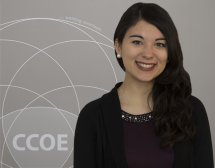
Ms MONICA DE ASTIS (23 years, Italy) has started an internship within the Public Affairs Office. Her main focus was the general improvement of CCOE’s current website, the focal information point where CIMIC interested civilians and militaries can meet and inform about the CCOE and Civil-Military Cooperation. She also supported the Public Affairs Office in the organization of events and in other tasks.
Graduated in ‘International Studies and European Institutions’ in December 2014 at the University of Milan, with a thesis about the role of Europol against organized crime, Monica gained an internship at EUROPOL (European Law Enforcement Agency – The Hague) some months later. She worked for half a year in the Office of the Director focusing her attention on stakeholder management and cross-departmental cooperation.
In 2011 Monica started to collaborate with a local newspaper in Milan and, by working constantly on her articles, she became journalist. Besides current news, culture, local politics and economics she writes about anti-mafia and organized crime as well, both for her blog ‘Nomos&Caos’ and for specialized online magazines.
During her university career in Milan she studied ‘Sociology of Organized Crime’, subject of her final thesis and directly linked to her social activism: Monica is indeed part of the Italian anti-mafia movement, organizing and taking part to activities aimed at increasing public awareness of organized crime’s impact on society.
“It is not our abilities that show what we truly are. It is our choices.” (J. K. Rowling)
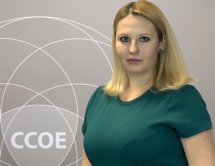 Ms. Andrada Balan (Romania, 29) commenced with her internship at the Training & Education (T&E) Branch of the CCOE in February 2017. In that role, she was part of the ongoing e-learning program, with focus on our new NATO CIMIC Strategic Planning Course (NCSPC). In addition, she was active in the transfer of knowledge from the ACO (Allied Command Operations) Civil-Military Cooperation Functional Planning Guide into interactive and engaging learning experience for students.
Ms. Andrada Balan (Romania, 29) commenced with her internship at the Training & Education (T&E) Branch of the CCOE in February 2017. In that role, she was part of the ongoing e-learning program, with focus on our new NATO CIMIC Strategic Planning Course (NCSPC). In addition, she was active in the transfer of knowledge from the ACO (Allied Command Operations) Civil-Military Cooperation Functional Planning Guide into interactive and engaging learning experience for students.
Before joining the CCOE, Andrada entertained traineeships at Europol in The Hague (2016), and the European Commission in Brussels (2014). At Europol, she successfully handled the corporate stakeholder management and cross-departmental cooperation in the Governance Department within the Office of the Director. At the European Commission, she supported the work of the Directorate General for Communication, organizing information visits (i.e. tailored short conferences) for medium to high level groups of members of national parliaments, civil servants, journalists and students from the EU and worldwide.
She is a strong believer in the power of information and communication when used correctly and smartly, by putting effective communication at the core of all personal and business interactions and cooperation.
Having worked for a year for international consulting power house Accenture, she became accustomed to the importance of a client-oriented business culture, establishing trust beyond just contacts as the basis of lasting relationships with all stakeholders.
A dedicated historian by training, she later specialized in International Relations (IR), focusing on foreign policy, security and defence, and diplomatic-military cooperation. In latter fields, she holds a Master’s Degree in this field from the University of Bucharest (2011) and a second one in Diplomacy and IR from the Diplomatic School of Madrid (part of the Ministry of Foreign Affairs), in 2012.
In her free time she reads about Spanish & Latin American contemporary history and confesses to be a social media and music “addict”.
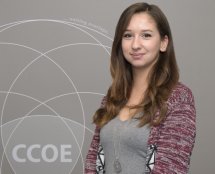
Ms. GIORGIA GRECHI (23, Italy) launched her CCOE internship within the Lessons Learned and Development Branch (LL/Dev) in October 2016. Her main tasks were the preparation, execution and evaluation of the Lessons Learned workshop for tactical CIMIC units. This will be done in close cooperation with the Multinational CIMIC Group. She also supported the development of a Lessons Learned module in the NATO CIMIC Higher Command Course and in the selection of a suitable case study.
Giorgia graduated in “International Studies and European Institutions” at the University of Milan, just as current CCOE intern Monica de Astis, who is working in the Public Affairs department of the CCOE. Currently, she is a Master’s student in International Cooperation and Development at the “Università Cattolica del Sacro Cuore” in Milan. During her academic career she developed a strong interest in various related subjects: international law, human rights, international relations and post-conflict and emergency management.
Before joining the CCOE, Giorgia engaged in varied opportunities to develop her professional credentials. In 2013, she worked as an intern in “Law and Human Rights” in Cordoba (ARG), where she conducted research for her thesis on the violation of human rights during the last military dictatorship in Argentina. In October 2015 she attend the “Functional Specialist Course” at the Multinational CIMIC Group in Motta di Livenza (ITA). Finally, in the summer of 2016 she worked in Haiti, in a neighborhood on the outskirts of the capitol Port-Au-Prince, on issues in “Cooperation and Development”.
 Mr. Patrick “Paddy” Considine (34, USA) began his CCOE internship at the Concepts, Interoperability and Capability (CIC) Branch in March 2017. There he supported the syndicate Development and Planning of the Community of Interest (COI) conference in Riga, Latvia in mid-May 2017.
Mr. Patrick “Paddy” Considine (34, USA) began his CCOE internship at the Concepts, Interoperability and Capability (CIC) Branch in March 2017. There he supported the syndicate Development and Planning of the Community of Interest (COI) conference in Riga, Latvia in mid-May 2017.
“Paddy” is currently in the second (and final) year of his postgraduate program at Trinity College Dublin, Ireland. There he is studying a Masters in Development Practice (MDP) program, which is part of a network of 31 similar postgraduate programs worldwide. The MDP program, created by special economic advisor to the Uited Nations (UN), Jeffrey Sachs, provides students an interdisciplinary approach to sustainable development and the challenges inherent to the UN Sustainable Development Agenda 2030. Prior to moving to Dublin, he lived and worked in Germany for almost nine years within the US Army.
Additionally, “Paddy” has a “second life” – as a Major in the United States Army Reserves. As a reservist, he has been a Civil Affairs officer (US version of CIMIC) for almost seven years. Prior to joining the Reserves, he was a full-time Soldier in the Infantry for five years. His undergraduate program was at the US Military Academy in West Point, New York. “Paddy” has spent almost 16 months total working in Afghanistan and has Civil Affairs experience supporting various exercises and training events across Europe and Tanzania.
In his off-time, he loves to travel – having visited 45 countries across 5 continents. As the “sole American” at the CCOE, “Paddy” understands the need to be an ambassador for his country and takes this responsibility seriously. Originally from the great state of Oklahoma, he was taught at an early age to never turn down a potential new friend or life experience.
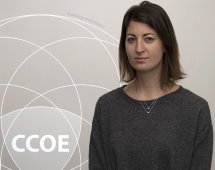 Starting January 2016, Ms Valeria Pozzessere (ITA) was conducting an internship within the Lessons Learned and Development Branch (LL/Dev). Her tasks particularly involved the development of the LL/Dev Integration Project, including mapping a community of interest and defining a marketing plan, and the launching of an interactive mobile application framework for collection and information sharing on mission at CIMIC level.
Starting January 2016, Ms Valeria Pozzessere (ITA) was conducting an internship within the Lessons Learned and Development Branch (LL/Dev). Her tasks particularly involved the development of the LL/Dev Integration Project, including mapping a community of interest and defining a marketing plan, and the launching of an interactive mobile application framework for collection and information sharing on mission at CIMIC level.
Ms Pozzessere has prior experience in the field of security and defense. Before joining the CCOE, she has worked in the Foreign Policy/Security and Defense Policy Division of the Ministry of Foreign Affairs of Italy and the Organization for Security and Co-operation in Europe (OSCE) as Election Observer in Ukraine.
Throughout her Master’s studies, Ms Pozzessere specialized in conflict resolution in the post-soviet region. Due to her extensive knowledge of Russian foreign policy and political transformations in the post-soviet area, she therefore actively contributed to the development of a recently established Brussels-based NGO, where she could gain practical experience in post-conflict peacebuilding and civil society reintegration in Azerbaijan, Armenia and Georgia.
Ms Pozzessere graduated from LUISS University (ITA) in 2013. Shortly after her graduation, she participated in the European Parliament Internship Program. For the purposes of her Master’s Degree, she conducted a research experience on post-conflict recovery at the NEEDS Project of the European Commission in Brussels. Her educational background also includes a Master’s Degree in Russian and Eurasian Studies at the European University in Saint Petersburg (RUS).
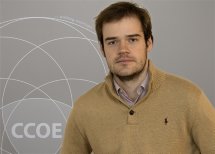
Mr. Enzo Sebastian Aguilera (GER) was conducting an internship at the Concept, Interoperability and Capabilities (CIC) Branch and the Legal Adviser (LEGAD) from March to April 2016. During this time he reviewed and proposed updates on the Rule of Law Make Sense publication. Next to that he developed the factsheet on Rule of Law as one of the Cross Cutting topics identified by the CCOE.
Enzo completed his Bachelor in Law at Maastricht University (NLD). He is currently studying Law and International Relations at Leiden University (NLD) with a focus on International Security.
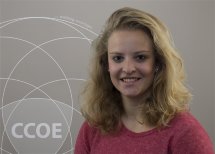 Ms. Lisa Ziekenoppasser (NLD) conducted her internship in the Lessons Learned & Development Section (LL/DEV) from March 2015 to January 2016. During her internship, Lisa looked into CIMIC activities and courses with a special focus on Africa to analyse the development and practical implications of CIMIC within missions deployed in Africa.
Ms. Lisa Ziekenoppasser (NLD) conducted her internship in the Lessons Learned & Development Section (LL/DEV) from March 2015 to January 2016. During her internship, Lisa looked into CIMIC activities and courses with a special focus on Africa to analyse the development and practical implications of CIMIC within missions deployed in Africa.
Lisa studied at the University of Nijmegen (NLD) where she obtained a Bachelor’s Degree in Political Science. Her thesis focused on the establishment of the European Police Mission (EULEX) in Kosovo. In august 2014 she successfully finished the Master’s program Law and Politics of International Security (LL.M) at the Free University of Amsterdam (NLD).
Throughout both her bachelor and master Lisa has gained extensive work experience. Before joining the CCOE, Lisa has worked in Münster within the First German/Netherlands Corps. She worked within the branches G3 and G9, while writing a research paper about the “Comprehensive Approach”. During her time in Münster, she participated in the exercises Common Effort, Odyssee Sword and Peregrine Sword. She wrote her Master thesis about regional security institutions, with an emphasis on the League of Arab States, at the Royal Military Academy in Breda where she stayed for five months. From August 2014 till February 2015, she performed an internship at the Netherlands Embassy in Pristina, Kosovo.
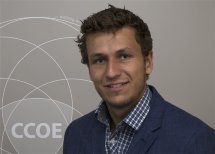 Mr. Koen van der West (NLD) conducted his internship at the Concept, Interoperability and Capabilities (CIC) Branch from July till October 2015. During this time he assisted in operationalizing the new NATO CIMIC/CMI doctrine (MC 411/2). More specifically Koen was involved in preparing and writing the CCOE CMI Survey report.
Mr. Koen van der West (NLD) conducted his internship at the Concept, Interoperability and Capabilities (CIC) Branch from July till October 2015. During this time he assisted in operationalizing the new NATO CIMIC/CMI doctrine (MC 411/2). More specifically Koen was involved in preparing and writing the CCOE CMI Survey report.
Koen studied at the University of Groningen (NLD) in which he obtained a Bachelor’s Degree in History. Nowadays he is finalizing a 1,5 year Master’s programme in International Humanitarian Action (NOHA), for which he studies at the University of Groningen and the University College Dublin (IRL). Koen is currently doing research for his Master thesis about civil-military communication within the MINUSMA mission in Gao (ML).
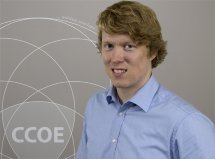 Mr. Arthur Bloemen (NLD) conducted his internship at the Concept, Interoperability and Capabilities (CIC) Branch from September until November 2015. During this time he developed a model for transferring theoretical Cross Cultural Competence (CCC) knowledge into practical applications and incorporate cross-cutting aspects of CIMIC/CMI related topics, using CCOE’s 3-Tier (CCC) model.
Mr. Arthur Bloemen (NLD) conducted his internship at the Concept, Interoperability and Capabilities (CIC) Branch from September until November 2015. During this time he developed a model for transferring theoretical Cross Cultural Competence (CCC) knowledge into practical applications and incorporate cross-cutting aspects of CIMIC/CMI related topics, using CCOE’s 3-Tier (CCC) model.
Arthur studied at the University of Amsterdam (NLD) in which he obtained a Bachelor’s Degree in Political Science. Currently he finalised a 2 year Master’s program at the University of Marburg (GER) and University of Kent (GBR) on Peace and Conflict Studies (focusing on Social psychology and Security). For his Master thesis Arthur wrote about the different perceptions on NATO’s role in the world and how these perceptions changed after the annexation of Crimea.
My CCOE Internship – More than Coffee and Copies
Project Manager interacting with Senior Leaders.
The standard internship: getting coffee and making copies for the department head. Everyone has heard of these type of internships, some may even have experienced it, luckily not me. There I am sitting at NATO Joint Force Command Brunssum, NL, interviewing 4-Star General Hans-Lothar Domröse and next I am going to Brussels in Belgium for a meeting with the International Committee of the Red Cross. No, my internship at the CIMIC Center of Excellence in The Hague is definitely not a standard internship!
When arriving at the CCOE, I was tasked with the project “Image Video”, based on my academic background. The CCOE intended to produce a video, introducing the general public to the scope of activity of the CCOE. Here I faced my first challenge: How to create a video on this organizations as a newcomer? So, with guidance from the head of the Public Affairs Office, I had to acquaint myself with the overall organization, as well as obtaining a thorough understanding of its scope and mission. With long papers full of abbreviations (first lesson: the military loves abbreviations) and some pleasant conversations with colleagues, I got to know the ins and outs of the CCOE. The next step was to create a message without all the abbreviations and technical details understandable to the general public. In close cooperation with an external production company, we created the key messages and the storyboard. And then the real work started…
As it is the goal of the CCOE to optimize Civil-Military Interaction in missions, the center maintains relations with many external, civilian parties. Since it is all about interaction, we believed it would be great to get some opinions on the CCOE from key leaders from the civilian and military worlds for the video. It was then my job to contact the senior representatives of major international and governmental organizations for their participation. This resulted in many phone calls, even more e-mails and meeting some very interesting people. Besides arranging contact, meetings, and interviews, I also researched and selected film footage and supported the external communication of the video release. Throughout this time, I also maintained the relationship with the production company and managed the progress of work from the side of the CCOE.
I feel privileged to having had the opportunity to meet so many interesting people as I did and to have been entrusted with these responsibilities during my internship. August 6th has come and the video is finally ready to be presented at a large conference in Sofia, while also being launched to the public online at the same time. It took some hard work but I am very proud to present the official video of the CCOE as my main internship project! Please check it out.
Best, Puck Beaumont
Intern at the CCOE’s Public Affairs Office
Ms. Puck Beaumont (NLD) conducted her internship in the P&C Branch at the Public Affairs Office from February to September 2015. She established a Standard Procedure for the development of annual Marketing Plans. In addition she prepared, organized and produced an Image Video regarding the CCOE’s new vision in cooperation with a Professional Video Company.
Puck was a student at the University of Tilburg. She has obtained a Bachelor’s Degree in Psychology and is now enrolled in the Master’s program Social Psychology, track Economic Psychology. Before joining the CCOE, Puck has worked with NATO-ACT, during the NATO Festival, as she was the Dutch Youth Ambassador for a period of 8 months.
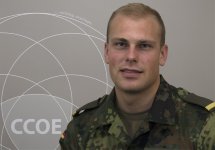
Trautermann, Alexander
Ensign Patrick Hauhut (OF- 1, GER) performed his internship within the CIC Branch at the Civil-Military Cooperation Centre of Excellence, staying at The Hague from July to August 14th. He contributed to the implementation of the “Master of Arts” program in Civil-Military Interaction (M-CMI). His project scope also included the writing of articles for military publications. Moreover, he analyzed educational methods and concepts in order to maximize the efficiency of integrating a study course.
ENS Hauhut is currently in his 5th year of military service in the German Navy and a student officer at the Helmut-Schmidt-University/University of the German Armed Forces, Hamburg. He received his Bachelor’s Degree in educational science with the focus on Vocational Science and Physical Education and is currently in the third trimester of his Masters’ studies.
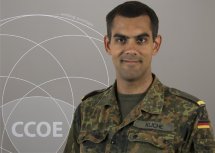
Kliche, Jan
Ensign Jan Kliche (OF – 1, GER) performed his internship in the CIC Branch of the CCOE from July through August 2015. During this time, he worked on the implementation of the joined university degree: “Master of Civil-Military Interaction (M-CMI)”. As such, he focused on the identification of the statutory framework for this program, as well as bringing this course work into the academic market place.
ENS Kliche is in the German Navy since 2009 and is currently a student officer at the Helmut-Schmidt-University/University of the German Armed Forces, Hamburg. He is studying educational science with a special focus on Personnel Management and Psychology, currently in the second term of his master’s degree.
Having studied for one semester at the United States Naval Academy at Annapolis, in 2014, his intention to further develop his knowledge of acting on the international stage brought him to the CCOE.
West Point cadets at the CCOE:
Learning the Art of CIMIC in the City of Peace and Justice
This summer, four cadets from the United States Military Academy at West Point joined the CCOE for three weeks to conduct their Advanced Individual Academic Development, in short AIAD, program. This has been already the third generation of US-Army cadets having had the opportunity to expand their horizons and to get a first flavor of Civil-Military Cooperation in a multinational environment. While the cadets have successfully contributed with innovative ideas to current projects of the CCOE’s Lessons Learned (LL) and Concepts, Interoperability & Capabilities (CIC) branches, the true value of their experience is in the exchange of ideas.
With yet another group from West Point at the CCOE, this program demonstrates continuity and follows a path towards institutionalization. This cooperation is a prime example for inter-organizational cooperation between West Point and the CCOE, as well as multinational exchange of young leaders. The integration into current projects fosters the exchange of ideas and leads to new perspectives beneficial for all participants. The CCOE is proud to be the preferred network campus and is looking forward to continue the dialogue. The following article is a personal reflection on their experience by the cadets.
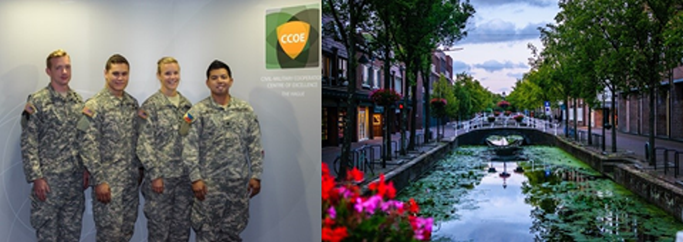
Left picture: West Point Cadets at CCOE. Matthew Morris (Environmental Geography, St Louis, MO,), John Goetz (International Relations, Montgomery, PA), Danielle Jordan (Human Geography, Dunedin, FL), Ian Rey Vales (Defense and Strategic Studies, Tagbina, SDS, Philippines). Right picture: A peaceful scene in one of the canals at Delft.
My first introduction to The Netherlands happened during a morning run to the beach in Kijkduin, after a late night flight arrival at Schiphol. I vividly remember both the chill of an early morning breeze, and the warmth of the gradually rising sun illuminating the canals, parks and eventually the beachfront facing the North Sea. Two things stuck in me the whole time: firstly, I was truly captivated by the serenity and beauty of the neighborhood, and secondly, I was convinced that the next few weeks would become a wonderful experience. Now that we’re leaving, I can say that it was indeed an amazing experience. At the end of our summer stint at the CCOE, all of us cadet interns not only gained a better understanding of Civil-Military Interaction / Civil-Military Cooperation (CMI/CIMIC) but also found a profound fondness to Holland, especially the cities of The Hague and Delft, and its people.
CCOE did a great job in fully immersing us into their multinational community. We worked under two branches: CIC and LL. We were given practical work assignments, learning hands the full spectrum of theoretical and technical knowledge on CMI/CIMIC. Cadets Goetz and Jordan contributed to the upcoming launch of the “Master in Civil-Military Interaction” by the CCOE jointly with the Helmut-Schmidt-University of the German Armed Forces. Cadet Morris and I, on the other hand, became part of the team beta-testing the CMI/CIMIC Mission App and the development of the 4th (electronic) edition of the CIMIC Field Handbook. These assignments gave us the opportunity to interact with and get expert-mentoring from the multinational members of the CCOE staff.
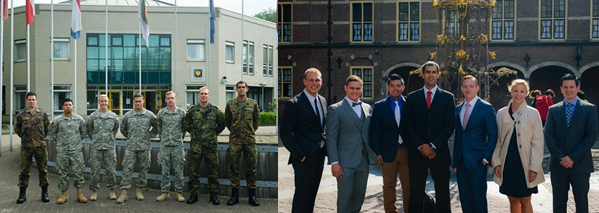
Left picture: The West Point cadets under the tutelage of Captain Marian Corbe (DEU), left; joined by two German ensigns from Helmut-Schmidt-University: Patrick Hauhut and Jan Kliche, right.Right picture: Following their visit to the U.S. Embassy in The Hague, students and tutors explored nearby government buildings at the Binnenhof.
But not all knowledge was gained just within the confines of the CCOE. The whole experience included helpful exchanges (some in the hallways, at the mess hall or at a barbecue), where we came into close interaction with armed services members of other NATO countries, a testament to a very open and positive atmosphere at the CCOE. This open environment ushered in various discussions about a wide range of topics including recent events in global and foreign policy, Dutch history and culture, and recommendations for local eats and sightseeing trips. The CCOE also facilitated a visit to our U.S. Embassy in The Hague. Colonel Leo Buzzerio (U.S. Army Attaché) and Ms Holly Lindquist Thomas (Economic Officer, U.S. Department of State) provided us insights on current diplomacy topics, advice on careers in the Foreign Service and an introduction to routine embassy matters. We were also able to get full local cultural immersion while visiting historic sites in Delft, The Hague, Rotterdam, Amsterdam and neighboring rural towns.


Exploring neighboring sites (clockwise from the left): tram wait to Den Haag Centraal, miniature windmill at Madurodam, shops at De Passage, parillada mixta at Los Argentinos Restaurant, shops at De Passage, multicolored sunset at Amsterdam Centraal, blue hour at Delft station. Stalwarts of LL/DEV: Ms. Lisa Ziekenoppasser and Staff Assistant Frank Nischik (DEU)
Asked about their time at The Hague, here are the thoughts of my fellow cadet interns on their experience at CCOE, as well as their key takeaways bringing back to the U.S.:
Cadet Matthew Morris: “I thoroughly enjoyed my time here in The Hague, both in and out of the office. While at work, I was constantly engaged with the permanent staff here on any matter in a range of topics from cultural differences to professional talk of how each branch of each sponsoring nation operates and cooperates as members of NATO. I learned just as much about the intricacies of working in a multinational coalition, as I did anything else. I could leave at the end of the day knowing that I had learned something new every day, whether it be CIMIC/CMI-related, or culturally. When outside of work, getting to enjoy the lovely Dutch summer, with all its fickle changes in weather, was an absolute pleasure. Because I currently live in New York, I regularly use mass transit and light rail systems like the Subway. However, being able to use a system as robust and reliable as the Netherlands’ was an absolute treat (despite what the Dutch may have to say about it). The notion of getting everywhere on bicycle is a foreign notion to most Americans, so utilizing one as a primary means of transportation was a refreshing change of pace, an ideal way of getting to explore the country.”
Cadet Danielle Jordan: “My perspective changed after learning how important CIMIC is in urban warfare, where the US has been engaged in and will be involved with in the future. I now know that this is an important topic which requires the existence of a Center of Excellence, because of the expertise that can be provided for war and crisis situations. I learned that working in such a multinational environment is both an asset and a challenge. Different nations are bringing different levels of expertise and experience to the table, but also a different military culture that can clash with others. I know now that this is a field I am passionate about and am looking forward to studying it further in the future. My key takeaway was to learn how to network and to be able to communicate effectively with others, as this is the key to CIMIC.”
Cadet John Goetz: “Prior to coming here, I had some understanding of CMI and CIMIC from research, yet with very limited experience with the topic. After my stay at the CCOE, I now understand not only how important CIMIC is, but also how it can be shaped through training and education. This opportunity has been very educational and very enlightening, and I hope to return some day. Daily interaction with co-workers from other nations gave me a chance to learn about the structure and culture of different countries’ armed forces. Thanks to the small, niche details that I learned, I can now view many aspects of my own military in a different light. I am very appreciative of this.”
As for my own thoughts, this experience solidified my belief in the key role of Civil-Military Cooperation in the future of modern conflict, especially in dealing with “Hybrid wars” and Counterinsurgency. The experience did not only provide me with a holistic view of CMI/CIMIC, but also gave me practical skills that I will be using as a future officer and member of a multinational community.
Now that our time at CCOE has ended, we will go back to West Point with fond memories and significant lessons from this incredible experience. We are looking forward to the time in the future when we will hopefully work in the CMI/CIMIC field and work with NATO.
Story by Ian Rey M Vales with an introduction by Captain Marian Corbe and contributions from Matthew Morris, Danielle Jordan and John Goetz. All photos belong to Ian Rey M Vales.
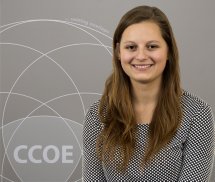 Ms. Sanne Evers (NLD) conducted her internship within the P&C Branch from February to April 2015 with the focus on event coordination. She defined and structured the internal event process for our courses and seminars which are held at CCOE.
Ms. Sanne Evers (NLD) conducted her internship within the P&C Branch from February to April 2015 with the focus on event coordination. She defined and structured the internal event process for our courses and seminars which are held at CCOE.
Sanne was a student in Tilburg (Business Administration – International Event, Music & Entertainment Studies). After studying in Kuala Lumpur, Malaysia for 4 months she started her first internship at CCOE.

